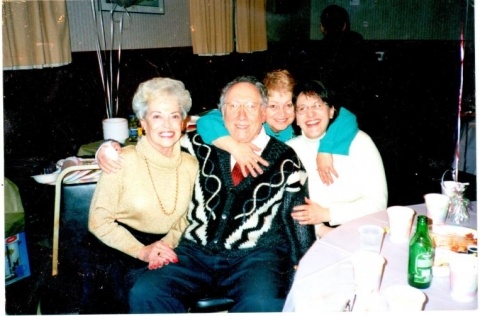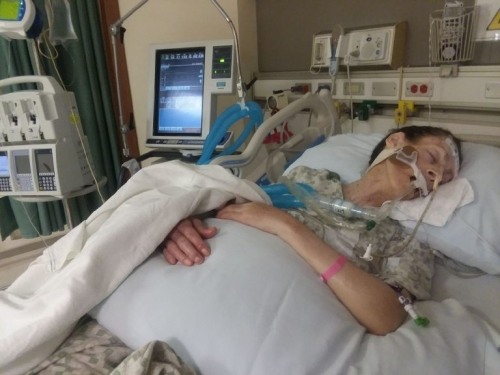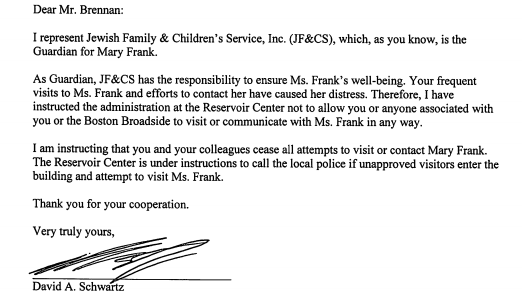 |
| Mary Frank |
by
Health Impact News/MedicalKidnap.com Staff
Boston is home to one of the first notorious cases of medical kidnapping that garnered widespread public attention, that of
Justina Pelletier,
seized by Boston Children’s Hospital and Child Protective Services, and
confined against her will and the will of her family in a psych ward.
It appears that the Boston area is a hub for medical kidnappings of adults as well as children.
In at least 4 cases that we know of in the Boston, Massachusetts, area, there is a web of common players who are interconnected.
Jewish Family and Children’s Services is the common denominator
for each of these senior citizens who were seized by Adult Protective
Services.
Instead of foster parents, “guardians” are court-appointed to take
control of their lives, assets, and medical decisions, leaving elder
adults victims of strangers they have never met, isolated from their
family and friends who are the ones that truly care about them. They are
accused of having “mental illness” and confined to psych wards against
their will.
Lonnie Brennan is the editor of a newspaper that has reported their stories,
The Boston Broadside.He
was recently served with a “No Trespass” order over the case of one
medically kidnapped lady, Mary Frank, who was trying to reach out to him
to get her story published. She was confined to a nursing home and
psych ward against her will, and denied basic human rights.
The people involved in holding her captive are apparently not
interested in her right to have visitors of her choosing, or her right
to have her voice heard.
Mary Frank’s story is connected to those of Beverley Finnegan and
Marvin Siegel, whose stories we have reported here on the MedicalKidnap
website.
You will read Mary’s story below. Alice Julian’s story will be coming
soon. She is another Boston area senior citizen who was medically
kidnapped. She died in January due to the withholding of life-sustaining
treatment.
We recently reported the medically-hastened death (euthanasia) of
Beverley Finnegan who was medically kidnapped. Attorney Lisa Belanger
fought alongside Janet Pidge in the valiant attempt to save Beverley’s
life. Her life was taken in January.
Here is her original story:
Lisa Siegel Belanger, Esq., learned about the medical kidnapping of
senior citizens when her own father Marvin Siegel was robbed of his
liberty in 2011. She and her sister are still fighting for his life and
freedom.
See his story:

Marvin Siegel with his family before the guardianship. Photo courtesy of family.
Mary Frank – Medically Kidnapped after Refusing to Commit Fraud
Lonnie Brennan of
The Boston Broadside visited Mary Frank in November 2017 for the first time. He recorded her story and wrote, “
Mary Frank: 69-Year-Old Thrown into Psych Ward by Government-Appointed Guardian.”
She is ordained as a Pentecostal minister and attended seminary in
her younger days. Even though she became confined to a wheelchair, Mary
Frank loved life and she loved her tiny apartment. She could still cook,
clean, and take care of herself.
She could not, however, go to the grocery store or drugstore by herself.
When she found that she was eligible for home healthcare services,
she thought that was good. She told Brennan that Minuteman Senior
Services contracted a service that sent out someone to help her for 3
hour blocks of time. The first caregiver seemed to be great, but after a
year, Mary learned that she had been stealing from her.
The next series of caregivers were not so great. They didn’t work the
3 hour block of time either. One reportedly only worked 20 to 40
minutes at a time. Mary told
The Boston Broadside:
And, they wanted me to sign a paper that said they were doing three hours. They were getting $18.70 per hour.
In my mind, that’s defrauding the federal government. What I found
out later was that that money … they were giving kickbacks. That money
that they were earning – they weren’t working for it – they were giving
kickbacks to Michelle Coakley and Minuteman protective services.
I was aghast. I mean, not that I’m ordained [Mary had explained that
she was ordained as a Pentecostal minister], but it’s fraud. That’s a
clear case of fraud.
I said, I can’t sign this. I can’t sign this paper. I want you to do the three hours.
Things got ugly when she refused to sign the paper. She reports that
Michelle Coakley of Minuteman Senior Services threatened her:
I thought she was going to strike me. She was outraged
and said to sign it, or you’ll be sorry. I didn’t understand the vitriol
that was coming out of this woman. I come from a place of peace and
love. I didn’t get it.

What Mary Frank didn’t realize was that Coakley had the power to follow through on her threats:
In September of 2013 there was a knock on the door…they
handcuffed me. Threw me in an ambulance and took me to Mount Auburn
Hospital on a Section 12 for psych.
She says that the psychiatrist had been lied to and told that she was
sitting in her own excrement and urine and that she threw out her
nurse. He realized that “this was bogus.” Even though Coakley reportedly
wanted her to be put on the psych ward, she was able to go home.
Three weeks later, she was seized again.
I said, ‘who’s signing these [psych] papers?’ Because she
[Coakley] got somebody who never even saw me – a psychiatrist – to sign
the papers.
The fraud was unbelievable…and they were so mean to me. They treated
me like I was some kind of a criminal. My arms were all full of bruises.
They pushed me around.
[Doctor] Rick Hayes saw me. He said, ‘what are you doing here?’ And I
was there, and what he did was he went and got his colleague, and she
leaned over and she said, ‘we’re going to get you out of here.’
I said, what is this? Is this legal? What is going on? And the nurse
came in and put her arms around me. And she said, ‘be careful because
she [Coakley] is not going to stop. She said I know people like this.
They’re not going to stop…’
This is insane… I don’t belong in a psych ward. So, I got sent home.
But, she [Coakley] showed up again and said, ‘I’ll put you somewhere where you’ll never get out.’
Shortly after, she received a summons for a hearing regarding
guardianship, set for November 20. Two days before the hearing, Mary
Frank was admitted to the hospital with knee problems that had to be
addressed.
She phoned Mary Kate Connolly, attorney for Minuteman Senior
Services, about an extension for the hearing. That call and her call to
the court went nowhere, and the hearing took place without her.
(Mary Kate Connolly of O’Sullivan and Connolly is also the private
attorney for Central Elder Services, the agency that facilitated the
appointment of a guardian for Alice Julian, whose story will be coming
soon.)
Without her presence at court, and with no due process, Mary Frank’s freedom was ended.
Jewish Family and Children’s Services was appointed as the guardian service for Mary. This is the same agency that was the guardian for the late
Beverley Finnegan, the late Alice Julian, and
Marvin Siegal. Individuals are assigned as guardians, but they work through Jewish Family and Children’s Services.

Lawyers
and guardians denied Beverley Finnegan the life-saving treatment her
sister wanted her to have. The guardianship cost her life. Photo
source.
Mary Frank shares the same judge as Beverley Finnegan – Probate Court Judge Maureen Monks.
Mary’s story continues:
And then this woman walks in named Robin Kosnick and
proceeded to tell me, ‘I’m going to put you away.’ And I said, who are
you? And she said, ‘I’m the guardian.’
Now, Minuteman Senior Services picks out the guardian. It should be
an autonomous guardian, or it should be a family member, or a friend –
until you can prove you’re OK. It shouldn’t be somebody who is connected
with the people who did this to you.
She said, ‘Michelle told me what to do with you. I’m putting you away.’
That is exactly what she allegedly did.
After Mary healed from knee surgery, the guardian tried to put her in
“a flop house in Everett.” It was so bad that the ambulance driver
allegedly refused to leave her there. He took her back to the hospital,
where she was forced to stay another 2 months “while she was waiting for
a bed to open up at Sudbury Pines in Sudbury.”
She put me in the dementia unit.
There should be – there’s got to be – a law somewhere.
And out of all of this, my prayer is that maybe we can get a state
senator or a state rep. to have some hearings at the State House that
you have to have an autonomous guardian, [and] that you have to be in
that courtroom … that you cannot be put in a dementia unit.
I was put in a dementia unit! Everybody there had dementia!
Everybody’s in diapers! Nobody could use a phone. Nobody could talk. And
the men would come in and take off their diapers and try to get in bed
with you naked.
It was like One Flew Over the Cuckoo’s Nest [movie]. And I’m there for three-and-a-half years. [Emphasis added.]
She contracted scabies in the dementia unit at
Sudbury Pines Nursing Home.
As difficult as it was for her to have the tiny mites burrowing under
her skin, the creatures were what finally got her out of captivity in
the lock-down dementia unit. She was transferred for an extended stay at
a hospital.

Photo of Mary Frank’s arm – taken by a Boston Broadside journalist at a visit.
Source.
Where Are Her Glasses and Dresses?
Since then, Mary Frank has been in a couple of different nursing
homes. She would love to have some of her things back that she never got
when she was seized from her home. She has been told that her things
were given to her current guardian, Pamela DeColo, who works for Jewish
Family and Children’s Services.
(Pamela DeColo was also involved with Beverley Finnegan. She was the supervisor over Beverley’s guardian, Marissa Levinson.)
Since Mary Frank told her story to
The Boston Broadside,
someone showed up at her nursing home with a few bags of items and a
“tiny” electric wheelchair, too small for her, that was not hers.
She is still waiting for her her glasses, dresses, wig, makeup, and HER electric wheelchair.
Is It Too Much to Ask for Proper Medical Attention, and a Remote Control?
Lonnie Brennan of
The Boston Broadside visited her at a
nursing home in Marlborough Hills in November to get her recorded
statement and again in December to take her a copy of the newspaper.
The next time he saw her was in January at the Reservoir
Rehabilitation Center in Marlborough, Massachusetts. He learned that she
had fallen at the previous nursing home. She was kept heavily medicated
before she was finally taken to the hospital, where they discovered
that her leg was broken.
Mary still needs medical attention.
She told Brennan that she had been asking for 2 weeks for a remote
control to the TV in her room. She wanted to be able to have at least
that tiny bit of control in her life.
Brennan told
Health Impact News that he called the business
office about getting her a remote. Both the business office and “Dan the
Handyman” told him that they would take care of it.
They didn’t.
Lonnie Brennan wrote about Mary Frank’s simple request for a remote control being ignored in the February print edition of
The Boston Broadside.
Journalist Told to Stay Away
Right after publication, Brennan received an email at 9:28 pm on
Saturday, Feb. 3, 2018, from attorney David Schwartz, telling the
newspaper editor that Jewish Family and Children’s Services didn’t want
him to visit Mary Frank.

David Schwartz leaving the courthouse during Beverley Finnegan’s case. Photo courtesy of Lisa Belanger.
(Schwartz was one of the attorneys involved in advocating for the euthanasia of Beverley Finnegan. See
link.)

Letter to Boston Broadside editor. Used with permission.
We spoke with Lonnie Brennan, who told us that he saw Mary Frank upon
HER request. She initiated contact with him. She wanted to get her
story out, and she wants her life back. It is clear that he is not the
one who is upsetting her.
Because Brennan was not served any papers, the email meant nothing legally.
Thus, when Mary Frank called him, again, to tell him that the nursing
home staff still had not gotten a remote control for her, he decided to
get her one. She had been asking for one for 4 weeks.
She also requested some chocolates that she could give to a few of the nurses for Valentines Day who have been kind to her.
When he arrived at the Reservoir Center on Saturday, February 10, he
noticed people watching him and whispering. Undeterred, he proceeded to
take the remote control and 6 boxes of chocolate candy to Mary Frank’s
room (4 for nurses, and 2 for her).
She welcomed his visit and was “near tears” with joy and gratitude.
She looked forward to being able to watch what she wanted (despite the
TV being blurry due to her glasses still being missing), and she shared
some of the chocolates with a few nurses before the rest were stolen.
“Wanted” for Random Acts of Kindness
Lonnie Brennan’s simple act of kindness to a woman suffering alone in
a nursing home resulted in the police being called. He learned that
there was even a “Wanted” poster at the nursing home with his picture on
it.
He was not accustomed to being on that side of the police. Before the
officers approached him, he reached out to them and introduced himself.
Brennan explained about the article and the remote control.
He also explained that no papers had been served and that the email had no legal power.
The incident was very cordial, and he was not detained.
That Friday, the editor was officially served with a “No Tresspass”
order. If he visits Mary Frank again, he is subject to a $100 fine and
30 days in jail.
His concern is that Mary’s right to have someone visit her has been violated.
What will happen to her if no one is allowed to see her and if no one is held accountable?
Medical Kidnapping Is a Very Real Risk – Seniors Better Off in Prison than Psych Wards in Nursing Homes
Brennan was a recent guest on the
Kuhner Report
talk radio show in Boston to discuss this story. He told Kuhner that
DCF, Massachusetts’ Child Protective Services, is nearly a billion
dollar business in the state of Massachusetts, and Adult Protective
Services is quickly heading there.
Rich or poor alike are at risk, said Brennan, from Mary Frank, who
just wants her dresses, wig, and makeup back (and her life), to
Marvin Siegal, who has had millions of dollars drained out of his estate by guardians.
He warned the radio host:
Once they have you, you are better off going to the
nearest liquor store and saying, ‘Hey, I’m robbing you.’ Because you’ll
get better health care and you’ll get better freedom if you are in
prison. I hate to say it.
And you’ll have more dignity in prison than you will have – than we have witnessed – in nursing homes.
Regarding Mary Frank, Lonnie Brennan says:
She’s pissed (her words). She just wants her life back.
Where Are Her Court Records?
According to
The Boston Broadside, Mary Frank’s court
records are nowhere to be found. Even if Mary Frank could raise funds
for an attorney without the guardian seizing the money, there are no
records that they can locate for an attorney to fight with:
Despite repeated efforts of the court clerks, all of Mary Frank’s files are reported missing.
Yes, read that again. The court files are missing for Docket No. MI 3P5348GD.
We even went so far as to engage the help of an attorney to attempt
to view the files. All the court clerks could do is confirm that, yes,
there were more than 16 entries, still logged in their computers, but
all of Mary Frank’s court documents are missing.
We’ve placed a written “File Search Request” with the Middlesex
Probate and Family Court, and asked to be notified should the files ever
mysteriously re-appear. Cue the crickets.
Where are the files? Have they been scrubbed? Is someone trying to erase Mary Frank?
(Note:
The Boston Broadside is raising funds to try to help Mary Frank. Information is in this
link.)
This
is the courthouse where life and death decisions are being made,
against the will of the people whose lives are decided. Photo courtesy
of Lisa Belanger.
What Can You Do to Help?
The main office number for Massachusetts Governor Charlie Baker is 617 725 4005. He may be contacted
here. He is also on
Twitter.
Massachusetts State Auditor Suzanne Bump has been asked to conduct an
audit of court appointed guardians and conservators, but she has
reportedly declined. Her office recently conducted an audit of CPS and
found many issues that need to be addressed.
See:
What would her office find if she audited Adult Protective Services?
Would she be able to track the corruption that is surely present?
Auditor Suzanne Bump may be reached at 617 727 2075, or contacted
here. She is also on
Facebook and
Twitter.
Maura Healey is the Massachusetts State Attorney General, tasked with
“combating fraud and corruption” and “investigating and prosecuting
crime,” according to the
website.
Attorney Lisa Belanger reports that she has reached out to Healey’s
office regarding the hastened deaths of Beverley Finnegan and Alice
Julian, but her staff told her that “the AG’s Office does not handle
this type of criminal matter.” (See
link.)
Belanger wants to know, “Why not?” It is a valid question.
Healey’s office number is 617 727 8400. AG Maura Healey is also on
Facebook.
Jewish Family and Children’s Services, the common denominator in each of these cases, may be reached at 781 647 5327. They are also on
Facebook and
Twitter.
How many more senior citizens will lose their lives or freedom due to
being medically kidnapped and placed under their guardianship? Even one
is too many.
Full Article & Source:
Public Warning: Boston is a Cesspool of Adult Medical Kidnappings





















